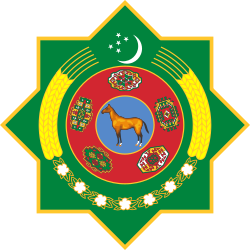 |
|---|
The following is a list of heads of government of Turkmenistan since the establishment of that position in 1925.
 |
|---|
The following is a list of heads of government of Turkmenistan since the establishment of that position in 1925.
| № | Portrait | Name (Born-Died) | Term | ||
|---|---|---|---|---|---|
| Took office | Left office | Duration | |||
| 1 | Gaygysyz Atabayev (1887–1938) | 20 February 1925 | 8 July 1937 | 12 years, 138 days | |
| 2 | Aýtbaý Hudaýbergenov (1906–1995) | October 1937 | 17 October 1945 | 8 years | |
| 3 | Suhan Babayev (1910–1995) | 17 October 1945 | 15 March 1946 | 149 days | |
| № | Portrait | Name (Born-Died) | Term | ||
|---|---|---|---|---|---|
| Took office | Left office | Duration | |||
| 1 | Suhan Babayev (1910–1995) | 15 March 1946 | 14 July 1951 | 5 years, 121 days | |
| 2 | Balysh Ovezov (1915–1975) | 14 July 1951 | 14 January 1958 | 6 years, 184 days | |
| 3 | Jumadurdy Karayev (1910–1960) | 14 January 1958 | 20 January 1959 | 1 year, 6 days | |
| (2) | Balysh Ovezov (1915–1975) | 20 January 1959 | 13 June 1960 | 1 year, 145 days | |
| 4 | Abdy Annaliyev (1920–2007) | 13 June 1960 | 26 March 1963 | 2 years, 286 days | |
| 5 | Muhammetnazar Gapurow (1922–1999) | 26 March 1963 | 25 December 1969 | 6 years, 274 days | |
| 6 | Oraz Orazmuhammedow (1928/1930–?) | 25 December 1969 | 17 December 1975 | 5 years, 357 days | |
| 7 | Bally Yazkuliyev (born 1930) | 17 December 1975 | 15 December 1978 | 2 years, 363 days | |
| 8 | Chary Karriyev (born 1932) | 15 December 1978 | 26 March 1985 | 6 years, 101 days | |
| 9 | Saparmurat Niyazov (1940–2006) | 26 March 1985 | 4 January 1986 | 284 days | |
| 10 | Annamurat Hojamyradow (born 1935) | 4 January 1986 | 17 November 1989 | 3 years, 317 days | |
| 11 | Han Ahmedow (1936–2006) | 5 December 1989 | 27 October 1991 | 1 year, 344 days | |
| № | Portrait | Name (Born-Died) | Term | Political Party | ||
|---|---|---|---|---|---|---|
| Took office | Left office | Duration | ||||
| 1 | Han Ahmedow (1936–2006) | 27 October 1991 | 18 May 1992 | 204 days | TDP | |
After the passing of the current Constitution of Turkmenistan in 1992, the position of prime minister was abolished and the president of Turkmenistan also became head of government.